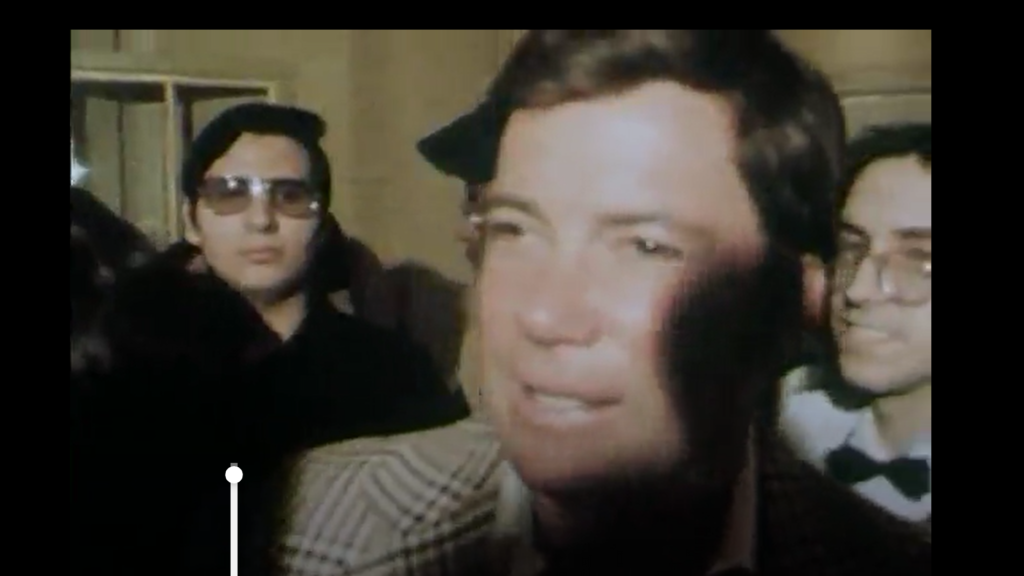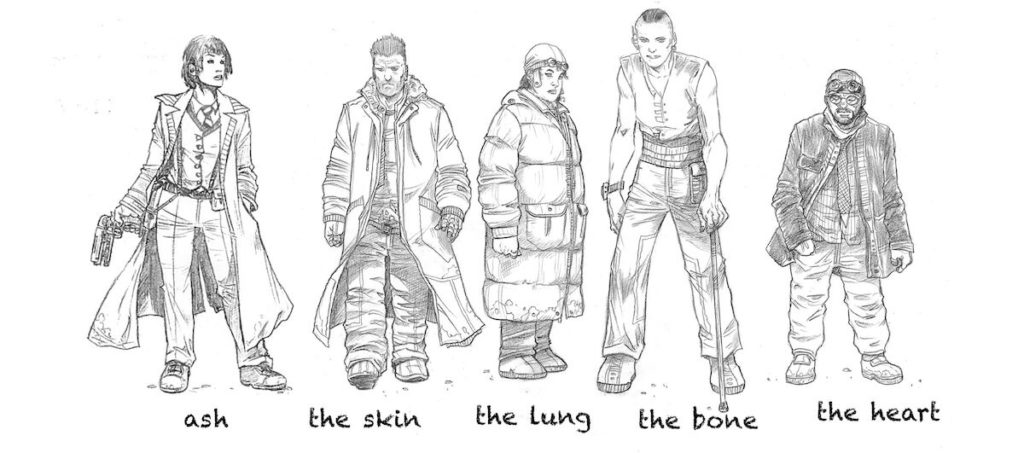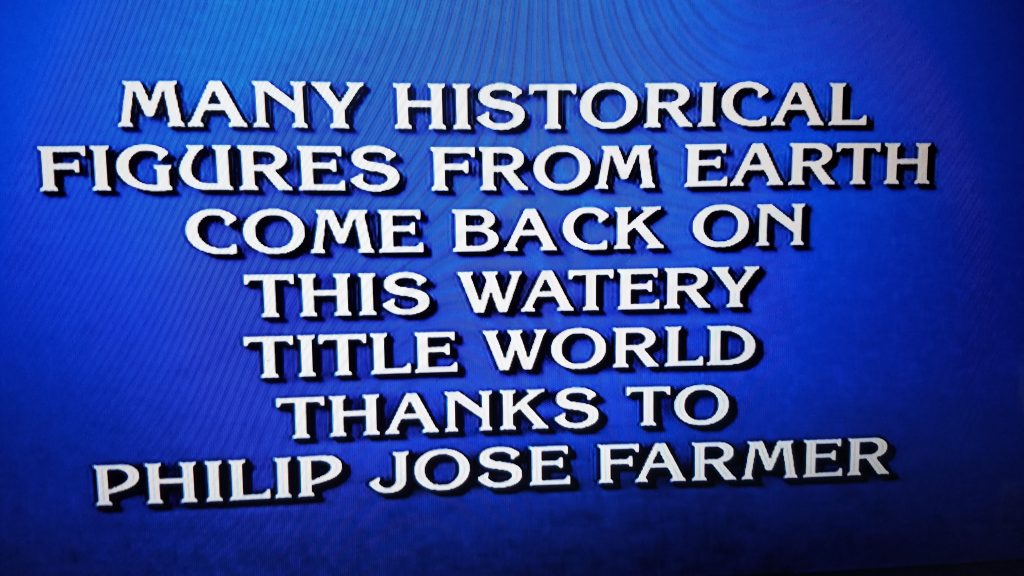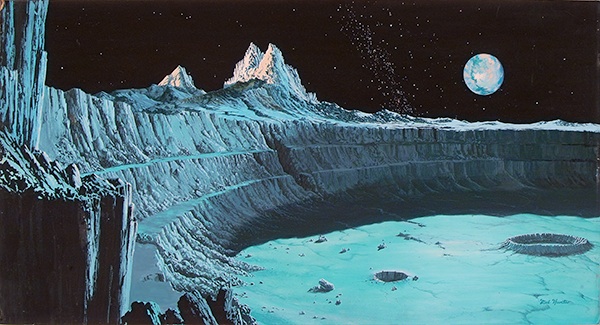(1) HIDDEN FIGURE HONORED. A NASA facility has a new name: “NASA Renames Facility in Honor of ‘Hidden Figure’ Katherine Johnson”.
NASA has redesignated its Independent Verification and Validation (IV&V) Facility in Fairmont, West Virginia, as the Katherine Johnson Independent Verification and Validation Facility, in honor of the West Virginia native and NASA “hidden figure.”
“I am thrilled we are honoring Katherine Johnson in this way as she is a true American icon who overcame incredible obstacles and inspired so many,” said NASA Administrator Jim Bridenstine. “It’s a fitting tribute to name the facility that carries on her legacy of mission-critical computations in her honor.”… Born in White Sulphur Springs, West Virginia, in 1918, Johnson’s intense curiosity and brilliance with numbers led her to a distinguished career — spanning more than three decades — with NASA and its predecessor agency, the National Advisory Committee for Aeronautics. Among her professional accomplishments, Johnson calculated the trajectory for Alan Shepard’s Freedom 7 mission in 1961. The following year, Johnson performed the work for which she would become best known when she was asked to verify the results made by electronic computers to calculate the orbit for John Glenn’s Friendship 7 mission. She went on to provide calculations for NASA throughout her career, including for several Apollo missions.
At a time when racial segregation was prevalent throughout the southern United States, Johnson and fellow African American mathematicians Dorothy Vaughan and Mary Jackson — who was later promoted to engineer — broke through racial barriers to achieve success in their careers at NASA and helped pave the way for the diversity that currently extends across all levels of agency’s workforce and leadership. Their story became the basis of the 2017 film “Hidden Figures,” based on the book by Margot Lee Shetterly.
(2) THE ART OF SIGNING. CoNZealand (2020 Worldcon) GoH Larry Dixon shares some wisdom in a Twitter thread that begins here.
(3) A GHOST SPEAKS. Sean McLachlan rises “In Defense of Professional Ghostwriting” at Black Gate.
…I’m acquainted with Cristiane Serruya. She was part of the Kindle Scout program, having won an advance, 50% royalties, and publication for at least one of her works from Amazon’s imprint Kindle Press. Two of my books are also in the program. We chatted numerous times on the Kindle Scout Winners Facebook group and we even traded critiques. She read the first two books in my Masked Man of Cairo mystery series and I read Damaged Love, which turns out to contain plagiarized passages too. At the time I was surprised she would want me to be a beta reader on a romance novel, a genre she knew I didn’t read and knew nothing about. Now I know why.
…It’s true that some unscrupulous people are hiring teams of underpaid ghostwriters to churn out dreck in order to game Amazon’s algorithms, which tilt in favor of newly publishing titles and prolific authors.
Unfortunately, professional ghostwriters like me are being lumped in with the hacks. There is a place for a professional ghostwriter in indie publishing, and it is a valid one.
Ghostwriting has been around since the days of the dime novel. It was strong throughout the pulp era and the post-war paperback boom. In the modern world, house names such as Don Pendleton (The Executioner) and Carolyn Keene (Nancy Drew) have been used by pools of ghostwriters to make some of the most popular series around.
Ghostwriting is my day job. To date, I have ghostwritten 18 novels, 7 novellas, and one short story for various clients, and am currently contracted for another series of novels. The clients are generally independent publishers who put out work under a variety of pen names. I get one or two pen names, and other ghostwriters get other ones. Thus each pen name keeps the specific tone of a particular writer. I have worked for one guy who used several ghostwriters writing for the same house name, but we all were given strict instructions as to tone, style, etc. None of my clients put their real name on their books, and all of them were looking for quality work….
(4) UP THE AMAZON. Nora Roberts expands on what she’s been learning about the environment for indie authors at Amazon: “Let Me Address This”.
A Broken System. Then came the scammers, and with the methods discussed in previous blogs, who flooded the market with 99 cent books. What a bargain! Readers couldn’t know these books were stolen or copied or written by ghostfarms. Couldn’t know about the clickfarms, the scam reviews.
At this price, the author receives only 30% (there’s a price point cut off on royalty rate). So all those out of pocket expenses may or may not be covered.
The legit indie saw her sales suffer, her numbers tank, her placement on lists vanish. To try to compete, many had to struggle to write faster, to heavily discount their work. Some had to give up writing altogether.
One other scamming method is to list a book–forever–as free. Not as a promotion, or incentive, but to toss up hordes or free books, so the reader wants–and often demands–free. They make their money off the scores of cheap and stolen books, and destroy the legit writer. Why pay when there are scores of free books at your fingertips?
(5) SFF ROMANCE AWARDS. The winners of genre interest for the 2018 Australian Romance Readers Awards are:
Favourite Paranormal Romance
- Ocean Light by Nalini Singh
Favourite Sci-Fi, Fantasy or Futuristic Romance
- Cursed by Keri Arthur
(6) FANHISTORY. Here’s a link to Archive.org footage from the 1975 Star Trek convention in New York. William Shatner’s appearance takes up the first few minutes – you can see Ben Yalow among his escorts at the 30-second mark. The latter half of the film shows a woman in front of art show panels – I think I should recognize her, but I can’t come up with a name. Maybe you can. [Update: Adrienne Martine-Barnes, maybe?] [Now identified as Jacqueline Lichtenberg.]

(7) TRIVIAL TRIVIA.
- On November 1, 1884 Bat Masterson published his first newspaper article in Dodge City. The newspaper was called Vox Populi.
(8) TODAY’S BIRTHDAYS.
[Compiled by Cat Eldridge.]
- Born February 24, 1786 — Wilhelm Grimm. Here for two reasons, the first being the he and his brother were the first to systematically collect folktales from the peasantry of any European culture and write them down. Second is that the number of genre novels and short stories that used the Grimms’ Fairy Tales as their source for source material is, well, if not infinite certainly a really high number. I’d wager that even taking just those stories in Snow White, Blood Red series that Terri Windling and Ellen Datlow co-edited would get quite a number based the tales collected by these bothers. (Died 1859.)
- Born February 24, 1909 — August Derleth. He’s best known as the first book publisher of H. P. Lovecraft, and for his own fictional contributions to the Cthulhu Mythos (a term that S. T. Joshi does not like), not to overlook being the founder of Arkham House which alas is now defunct. I’m rather fond of his detective fiction with Solar Pons of Praed Street being a rather inspired riff off the Great Detective. (Died 1971.)
- Born February 24, 1933 — Verlyn Flieger, 86. Well known Tolkien specialist. Her best-known books are Splintered Light: Logos and Language in Tolkien’s World, A Question of Time: J. R. R. Tolkien’s Road to Faerie, which won a Mythopoeic Award, Tolkien’s Legendarium: Essays on The History of Middle-earth (her second Mythopoeic Award) and Green Suns and Faërie: Essays on J.R.R. Tolkien (her third Mythopoeic Award). She has written a VA fantasy, Pig Tale, and some short stories.
- Born February 24, 1942 — Sam J. Lundwall, 77. Swedish writer, translator and publisher. He first started writing for Häpna!, an SF Zine in the 50s. In the late 60s, he was a producer for Sveriges Radio and made a SF series. He published his book, Science Fiction: Från begynnelsen till våra dagar (Science Fiction: What It’s All About) which landed his first job as an SF Editor. After leaving that publisher in the 80s, he would start his own company, Sam J. Lundwall Fakta & Fantasi. Lundwall was also the editor of the science fiction magazine Jules Verne-Magasinet between 1972 and 2009. He has been active in fandom as he organised conventions in Stockholm six times in the 60s and 70s. And I see he’s written a number of novels, some released here, though not recently.
- Born February 24, 1947 — Edward James Olmos, 72. Reasonably sure the first thing I saw him in was as Detective Gaff in Blade Runner, but I see he was Eddie Holt In Wolfen a year earlier which was his genre debut. Though I didn’t realise it as I skipped watching the entire film, he was in The Green Hornet as Michael Axford. (I did try watching it, I gave up after maybe fifteen minutes. Shudder.) he has a cameo as Gaff in the new Blade Runner film. And he’s William Adama on the new Battlestar Galactica. He was made appearances on Agents of S.H.I.E.L.D. and Eureka.
- Born February 24, 1966 — Ben Miller, 53. He first shows up in our corner of things on The Adventures of Young Indiana Jones in the “Daredevils of the Desert” episode as an unnamed French Officer. His main genre role was on Primeval, a series I highly recommend as a lot of fun, as James Lester. He later shows up as the Sheriff of Nottingham in a Twelfth Doctor episode entitled “Robot of Sherwood”.
- Born February 24, 1968 — Martin Day, 51. I don’t usually deal with writers of licensed works but he’s a good reminder that shows such as Doctor Who spawn vast secondary fiction universes. He’s been writing such novels first for Virgin Books and now for BBC Books for over twenty years. In addition, he’s doing Doctor Who audiobooks for Big Finish Productions and other companies as well. He’s also written several unofficial books to television series such as the X Files, the Next Generation and the Avengers.
(9) COMICS SECTION.
- C.S. Lewis fans will appreciate this Saturday Morning Breakfast Cereal joke.
(10) LEGAL EAGLE. John Scalzi has been doing his due diligence this afternoon.
(11) ROLE OF A LIFETIME. Cleveland.com has a conversation with the actor: “Wil Wheaton wraps up run as Wil Wheaton on ‘Big Bang Theory’”.
…Then “Big Bang” executive producer and co-creator Bill Prady offered him the ideal role. Would he be interested in playing, well, Wil Wheaton . . . an evil Wil Wheaton?
“If they had actually wanted me to play myself, I don’t think I would have been interested,” he said. “First, it would have felt like a cheat. So what? Show up and be yourself? There’s no challenge in that. But when Bill said, ‘We want you to play an evil version of yourself,’ I immediately got and loved that idea.”
(12) PAPERS PLEASE. Spikecon has put out a “Call for Academic Submissions”:
Westercon 72, NAFIC 2019, 1632 Minicon, and Manticon 2019 are together inviting submissions of academic papers for presentation at Spikecon to be held on July 4th-7th, 2019 in Layton, Utah. We are seeking 30 minute papers which raise the level of dialogue and discussion in the Science Fiction/Fantasy community and seek to empower fans as well as creators.
Topics of Interest Include:
- Literary analysis/criticism of science fiction or fantasy works including those of our Spikecon Guests of Honor
- Historical events impacting science fiction and/or fantasy works
- Fandom
- Developments in science and technology
- Craft of writing
- Cultural impact of scifi/fantasy
- Fan and creator relationship
- Studies of individual creators/universes
(13) PLAY BY MALE. NPR’s Etelka Lehoczky says “Chronin’s Elegant, Minimalist Samurai Adventure Is – Literally – Timeless”.
Let’s hear it for cleverness! Sometimes a few modest, well-thought-out ideas can add up to an artistic creation as impactful as — and even more appealing than — the weightiest projects. That’s the case with Chronin, Alison Wilgus’ new graphic novel. Like a miniaturist or scrimshaw engraver, Wilgus has a keen appreciation for the power of constraints. By setting careful limits on what her book will look like and what kind of story it will tell, she’s achieved an aesthetic balance that’s a thing of beauty in itself.
Chronin is lighthearted but not frivolous, simple but not simplistic. Since it’s set in 19th-century Japan, you could compare it to a netsuke: A tiny sculpture whose beauty lies in what it does with so little. Chronin’s narrative and visual themes are rather basic, but it explores them in a way that’s precise, insightful — and supremely clever.
Wilgus has experimented with artistic constraints before. A Stray in the Woods, published in 2013, originated as a Tumblr webcomic driven by suggestions from readers. And, of course, much of her work has been shaped by the will of her employers, including DC and the Cartoon Network. Plenty of creators try to blow the doors off with their first solo graphic novels, but Wilgus takes the opportunity to go small. Chronin’s story of a time-travel screw-up is familiar, even a bit of a chestnut. Protagonist Mirai Yoshida, a New York City college student in 2042, travels with some classmates back to 1864 Japan to conduct research. An accident leaves her trapped there, so she masquerades as a male — and as a member of the warrior class — for safety while she tries to figure out a way back.
(14) SURVEYING THE FIELD. Rich Horton winds up his Hugo discussion with “Hugo Nomination Thoughts, 2019: Summary Post”. One item he touches on is —
Best Series
Here’s JJ’s list of eligible series posted at File 770: https://file770.com/best-series-hugo-eligible-series-from-2018/. Much props to JJ for the tireless work of maintain this list, but … I think the list itself speaks to problems with the whole concept of this award.
I was skeptical about this award from the start, and I don’t think its history helps it. I’m really bothered by the way adding one short story to a very old series, for example, makes it again eligible (as with Earthsea, objectively by far the most worthy and influential eligible series, but does “Firelight”, beautiful as it absolutely is, really mean we should give it an award now?) Also, the endless parsing of “series” vs. “sub-series”. The way an award can be for, really, semi-random assemblages of related works. I could go on and on.
(15) TWEETING HISTORY. Myke Cole is running a giveaway, and has been retweeting some of the choicer quotes people are submitting. For example:
(16) BACKING UP TO THE MOON. CNET: “Thirty-million-page backup of humanity headed to moon aboard Israeli lander”.
If the apocalypse strikes, the Arch Mission Foundation wants to be sure all the knowledge we’ve accumulated doesn’t disappear.
On Thursday night, a SpaceX Falcon 9 rocket carried an Israeli-made spacecraft named Beresheet beyond the grasp of Earth’s gravity and sent it on its way to the surface of the moon. On board Beresheet is a specially designed disc encoded with a 30-million-page archive of human civilization built to last billions of years into the future.
The backup for humanity has been dubbed “The Lunar Library” by its creator, the Arch Mission Foundation (AMF).
“The idea is to place enough backups in enough places around the solar system, on an ongoing basis, that our precious knowledge and biological heritage can never be lost,” the nonprofit’s co-founder Nova Spivack told [CNET] via email.
(17) THE FLYING DEAD. Salon: “Zombie stars shine on after mystery detonations”.
It should have been physically impossible. Millions of years ago, a white dwarf—the fading cinder of a sunlike star—was locked in a dizzying dance with a bright companion star. The two had circled each other for eons, connected by a bridge of gas that flowed from the companion onto the white dwarf allowing it to grow heavier and heavier until it could no longer support the extra weight. At this point, the white dwarf should have exploded—blowing itself to smithereens and producing a supernova that briefly shone brighter than all the stars in the Milky Way combined. Then once the supernova faded and the white dwarf’s innards were dispersed across the galaxy, there would quite literally be nothing left save for its companion star. But against all odds, the explosion did not fully rupture the white dwarf. Instead, it survived.
…Raddi’s team made these discoveries after combing through data from the European Space Agency’s Gaia spacecraft, which is particularly well suited for finding high-speed stars—an important characteristic of ones like LP 40-365 (because a supernova explosion has the power to slingshot stars across the galaxy). Two are destined to escape the Milky Way entirely, and one is orbiting “backward” against the usual rotation of stars in our galaxy. Additionally they all boast large radii, presumably because they were puffed up by the extra energy they received from the failed explosion. And yet they possess relatively small masses, likely due to the loss of much of their material during the explosion. But perhaps the most compelling evidence these stars are supernova survivors is that they brim with heavier elements. Whereas typical white dwarfs comprise carbon and oxygen, these stars are mostly composed of neon. “That’s absurd,” Hermes says. “That’s like some barroom beer sign just flying through the galaxy.” The stars’ second-most common element is oxygen, followed by a sprinkling of even heavier elements such as magnesium, sodium and aluminum. “This is about as weird as it gets,” Hermes says…
(18) IT’S A THEORY. Orville’s season 1 Rotten Tomatoes critics score was 23%. Season 2 is holding at 100%. Nerdrotic theorizes that the explanation is Disney’s purchase of Fox.
(19) BLADE RUNNER COMICS. Launching this summer, Titan Comics’ new Blade Runner 2019 series will be set
during the exact timeframe of the original Blade Runner film, and feature a (mostly) new set of
characters and situations.
Titan also confirmed that noted artist Andres
Guinaldo (Justice
League Dark, Captain America)
will be joining acclaimed Blade
Runner 2049 screenwriter
Michael Green (Logan) and veteran collaborator Mike Johnson (Star Trek,
Superman/Batman)
to breathe life into their all-new Blade Runner comic books.

(20) AND HE’S NOT EVEN WELSH! CBR.com checks out “Superman’s Less Legendary LL’s!”.
In Drawing Crazy Patterns, I spotlight at least five scenes/moments from within comic book stories that fit under a specific theme (basically, stuff that happens frequently in comics). Note that these lists are inherently not exhaustive. They are a list of five examples (occasionally I’ll be nice and toss in a sixth). So no instance is “missing” if it is not listed. It’s just not one of the five examples that I chose.
Today, we look at the less legendary LLs in Superman’s life.
Unless you hate me and all that I stand for, you know that Superman has an inordinate amount of notable people in his life whose names are double Ls.
Names (etc.) mentioned in the 2-page article include:
* Lori Lemaris
* Lightning Lad
* Little League (seriously)
* Lita Laverne
* Lester Link
* Liza Landis
* Lyrica Lloyd
* Lorraine Lewis
(21) CLOUDY, WITH A CHANCE OF DRAGONS. HBO puts out mashup trailer to coincide with the Oscars — SYFY Wire: “Arya Stark beholds dragon for first time in HBO mashup trailer; new Watchmen footage also included”.
Just like it did during the Golden Globes, HBO has released another mega-trailer featuring new footage from all of its new and returning shows airing this year. Of course, the eighth and final season of Game of Thrones was among the shows included in the tantalizing teaser.
[…] Game of Thrones Season 8 debuts on HBO Sunday, April 14. There’s no set premiere date for Watchmen just yet, but it will arrive sometime this year.
(22) FROM THE BEEB TO THE BO. BBC released a trailer of His Dark Materials, which will air on HBO in the U.S.
We’re keeping our daemons close. Here’s an early sneak peek of His Dark Materials. Dafne Keen, Ruth Wilson, James McAvoy, Clarke Peters and Lin-Manuel Miranda star in this thrilling new series. Adaptation of Sir Philip Pullman’s acclaimed series of novels.
[Thanks to Mike Kennedy, Cat Eldridge, Your Supreme Awesome Royal Majesty Highnessness JJ, John King Tarpinian, Chip Hitchcock, Martin Morse Wooster, Carl Slaughter, and Andrew Porter. Title credit goes to File 770 contributing editor of the day Andrew.]















